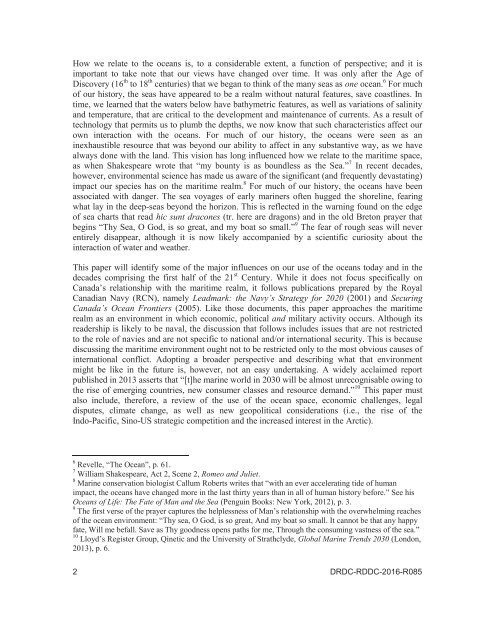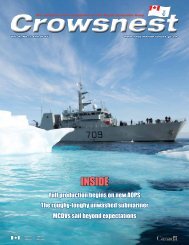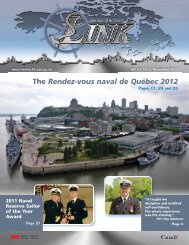You also want an ePaper? Increase the reach of your titles
YUMPU automatically turns print PDFs into web optimized ePapers that Google loves.
How we relate to <strong>the</strong> oceans is, to a considerable extent, a function <strong>of</strong> perspective; <strong>and</strong> it is<br />
important to take note that our views have changed over time. It was only after <strong>the</strong> Age <strong>of</strong><br />
Discovery (16 th to 18 th centuries) that we began to think <strong>of</strong> <strong>the</strong> many seas as one ocean. 6 For much<br />
<strong>of</strong> our history, <strong>the</strong> seas have appeared to be a realm without natural features, save coastlines. In<br />
time, we learned that <strong>the</strong> waters below have bathymetric features, as well as variations <strong>of</strong> salinity<br />
<strong>and</strong> temperature, that are critical to <strong>the</strong> development <strong>and</strong> maintenance <strong>of</strong> currents. As a result <strong>of</strong><br />
technology that permits us to plumb <strong>the</strong> depths, we now know that such characteristics affect our<br />
own interaction with <strong>the</strong> oceans. For much <strong>of</strong> our history, <strong>the</strong> oceans were seen as an<br />
inexhaustible resource that was beyond our ability to affect in any substantive way, as we have<br />
always done with <strong>the</strong> l<strong>and</strong>. This vision has long influenced how we relate to <strong>the</strong> maritime space,<br />
as when Shakespeare wrote that “my bounty is as boundless as <strong>the</strong> Sea.” 7 In recent decades,<br />
however, environmental science has made us aware <strong>of</strong> <strong>the</strong> significant (<strong>and</strong> frequently devastating)<br />
impact our species has on <strong>the</strong> maritime realm. 8 For much <strong>of</strong> our history, <strong>the</strong> oceans have been<br />
associated with danger. <strong>The</strong> sea voyages <strong>of</strong> early mariners <strong>of</strong>ten hugged <strong>the</strong> shoreline, fearing<br />
what lay in <strong>the</strong> deep-seas beyond <strong>the</strong> horizon. This is reflected in <strong>the</strong> warning found on <strong>the</strong> edge<br />
<strong>of</strong> sea charts that read hic sunt dracones (tr. here are dragons) <strong>and</strong> in <strong>the</strong> old Breton prayer that<br />
begins “Thy Sea, O God, is so great, <strong>and</strong> my boat so small.” 9 <strong>The</strong> fear <strong>of</strong> rough seas will never<br />
entirely disappear, although it is now likely accompanied by a scientific curiosity about <strong>the</strong><br />
interaction <strong>of</strong> water <strong>and</strong> wea<strong>the</strong>r.<br />
This paper will identify some <strong>of</strong> <strong>the</strong> major influences on our use <strong>of</strong> <strong>the</strong> oceans today <strong>and</strong> in <strong>the</strong><br />
decades comprising <strong>the</strong> first half <strong>of</strong> <strong>the</strong> 21 st Century. While it does not focus specifically on<br />
Canada’s relationship with <strong>the</strong> maritime realm, it follows publications prepared by <strong>the</strong> Royal<br />
Canadian Navy (RCN), namely Leadmark: <strong>the</strong> Navy’s Strategy for 2020 (2001) <strong>and</strong> Securing<br />
Canada’s Ocean Frontiers (2005). Like those documents, this paper approaches <strong>the</strong> maritime<br />
realm as an environment in which economic, political <strong>and</strong> military activity occurs. Although its<br />
readership is likely to be naval, <strong>the</strong> discussion that follows includes issues that are not restricted<br />
to <strong>the</strong> role <strong>of</strong> navies <strong>and</strong> are not specific to national <strong>and</strong>/or international security. This is because<br />
discussing <strong>the</strong> maritime environment ought not to be restricted only to <strong>the</strong> most obvious causes <strong>of</strong><br />
international conflict. Adopting a broader perspective <strong>and</strong> describing what that environment<br />
might be like in <strong>the</strong> future is, however, not an easy undertaking. A widely acclaimed report<br />
published in 2013 asserts that “[t]he marine world in 2030 will be almost unrecognisable owing to<br />
<strong>the</strong> rise <strong>of</strong> emerging countries, new consumer classes <strong>and</strong> resource dem<strong>and</strong>.” 10 This paper must<br />
also include, <strong>the</strong>refore, a review <strong>of</strong> <strong>the</strong> use <strong>of</strong> <strong>the</strong> ocean space, economic challenges, legal<br />
disputes, climate change, as well as new geopolitical considerations (i.e., <strong>the</strong> rise <strong>of</strong> <strong>the</strong><br />
Indo-Pacific, Sino-US strategic competition <strong>and</strong> <strong>the</strong> increased interest in <strong>the</strong> Arctic).<br />
6 Revelle, “<strong>The</strong> Ocean”, p. 61.<br />
7 William Shakespeare, Act 2, Scene 2, Romeo <strong>and</strong> Juliet.<br />
8 Marine conservation biologist Callum Roberts writes that “with an ever accelerating tide <strong>of</strong> human<br />
impact, <strong>the</strong> oceans have changed more in <strong>the</strong> last thirty years than in all <strong>of</strong> human history before.” See his<br />
Oceans <strong>of</strong> Life: <strong>The</strong> Fate <strong>of</strong> Man <strong>and</strong> <strong>the</strong> Sea (Penguin Books: New York, 2012), p. 3.<br />
9 <strong>The</strong> first verse <strong>of</strong> <strong>the</strong> prayer captures <strong>the</strong> helplessness <strong>of</strong> Man’s relationship with <strong>the</strong> overwhelming reaches<br />
<strong>of</strong> <strong>the</strong> ocean environment: “Thy sea, O God, is so great, And my boat so small. It cannot be that any happy<br />
fate, Will me befall. Save as Thy goodness opens paths for me, Through <strong>the</strong> consuming vastness <strong>of</strong> <strong>the</strong> sea.”<br />
10 Lloyd’s Register Group, Qinetic <strong>and</strong> <strong>the</strong> University <strong>of</strong> Strathclyde, Global Marine Trends 2030 (London,<br />
2013), p. 6.<br />
2 DRDC-RDDC-2016-R085




